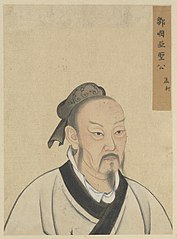This week
人性之善也,猶水之就下也
Translation: Humans are good by nature.
Broken down into words
人:human, person
性:nature, character, personality
- 人性:human nature, human personality
之:that/who (refers to the human)
善:good, benevolent, virtuous
也:is
猶:is the same as
水:water
之:that (refers to water)
就:as per usual
下:downward
也:goes (refers to flowing water)
February is almost over! So sad, it means our weekly writings about Chinese proverbs are quickly coming to a stop. Though, no need for actual tears. Spring is around the corner. Get ready for lush-green trees, warmer weather, and a general spirit of happiness throughout everyone. That must be a relief, after the past two weeks of stormy weather (thank you, Ciara and Dennis). We are excited for spring. But for this week, let’s keep at it. Bundle up and in between the drops, read our piece about the last proverb!
The idea


人性之善也,猶水之就下也 – so long and complicated! It’s alright. Not too bad. The shortest translation we can think of is: “humans are good by nature”. Mencius was the first guy to write down this quote. He was a philosopher who lived during the Warring States Period in Chinese history. That would be between 400 and 300 before the common era.
Let’s have a closer look at the proverb. The full version is quite a bit longer, indeed, and explains the idea behind it all.
人性之善也,猶水之就下也;人無有不善,水無有不下。
Rén xìng zhī shàn yě, yóu shuǐ zhī jiù xià yě; rén wú yǒu bù shàn, shuǐ wú yǒu bù xià.
The first phrase, before the semicolon, is the actual proverb. It translates as: “humans are good by nature, as water always flows downward”. After the semicolon, there is some explanation on that statement. It reads: “human nature has nothing that is not good like water cannot not (= must) flow downward”. These many negations are quite characteristic of Chinese proverbs, so don’t worry about them being a bit confusing. It’ll make sense in the end, we promise!
Mencius wants to tell us that human nature is good. Only outside factors can influence humans to behave in a bad way. He asks, when someone is exposed to only good influences, how can a human be bad? Anyway, Mencius emphasizes his claim by comparing it to flowing water, making his statement timeless. Much has changed in the world since the four-thousand-year period that he wrote this down, but water still flows downward!
Besides this, Mencius also proposes a thought experiment, to prove that his claim indeed is correct. It’s quite a popular story. Here it is:
Somewhere in Central China, there’s a little village. Around the edge of the village, there is a well. Every day, the villagers get their water here. Often, children are seen playing around the well. There, they have enough space to run around. A few villagers are watching the children from some distance. Suddenly, one of the children falls into the well. The villagers cannot see which child falls into the well, but they immediately run to the well and rescue the child, before it drowns.
For the villagers, it doesn’t matter whose child it is. They all react because they can feel that letting a child drown is wrong. Mencius says that because the incident happens so fast, the villagers don’t have time to logically overthink their decision to rescue the child and thus act out of personal gain.
If we all, like Mencius, live by the assumption that people are good, we don’t have to worry about evil intentions. Forgiving is easy and getting angry is not always necessary. When someone does something you don’t like, take the proverb to heart and realize that this person is probably not intentionally annoying you. Perhaps they woke up on the wrong side of the bed. Be friendly to the people around you. We all live on the same Earth, and we just have to share this place with a lot of people. Let’s try to be harmonious, without useless conflict and no internalized anger.
Be nice. 😉

